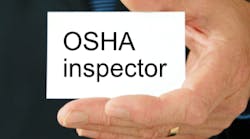Is your dental office prepared for an OSHA visit?
OSHA from the dentist's perspective
Dr. Dennis Benton of Mint Dental Team is familiar with the Occupational Safety and Health Administration (OSHA) from his days before dental school. “My previous experience with OSHA was in various jobs I held before I attended OSU College of Dentistry. I handled various hazardous chemicals, operated different machinery, and more. There are things in all jobs that must be considered for safety.”
Now as the owner of a general dentistry practice, Dr. Benton makes sure his team receives regular safety training. “Ongoing OSHA training is important for every team member because every business experiences attrition in staff. This creates new positions in the business, which may lead to subtle changes in daily procedures. These changes can either benefit everyone or put everyone at risk of injury.
“Often a change can be made without thinking about its total consequence,” Dr. Benton continued. “In our office we have annual OSHA meetings and monthly staff meetings, and we also bring attention to any concerns regarding patient care in our daily morning huddle before the start of the day. With a growing office, it’s important to encourage new hires to look for areas of improvement, as well as provide training to set expectations.”
Sometimes the staff stays put and it’s the dentist who transitions. Dr. Lisa Poweski of Elite Endodontics took on a busy endodontic practice. “It was important to me as the employer to know that the practice transition went smoothly because I wanted our employees and patients to be comfortable with me as a new employer.”
The previous dentists had a detailed and robust safety program in place, and they ensured annual updates were communicated to the team. They also welcomed comments from staff, and that communication continues to this day. “In our office we encourage employees to report safety concerns by telling them if they see something, say something. It is for the benefit of the entire office and for the well-being of our patients.”
Having a comprehensive safety program and open dialogue is important for maintaining a consistent office culture of safety. This also better prepares the office staff should there be an investigation. An important operating procedure offices should consider training for is what to do when OSHA visits.
OSHA legal insights from attorney Alicia Nesline Shaw
There are many legal and related items to consider regarding an inspection. The first thing to do is to calm down and be professional in your or your staff’s interactions with the inspector. This may seem obvious, but you and your staff set the tone for the entire process by how you interact with the investigator at the first meeting. It’s best to start the investigation off on the right foot.
Next, consider involving legal counsel. This is especially good for an employer that has not been through prior inspections or if the employer reasonably believes the inspection may lead to violations. Your legal counsel may have some helpful advice before the inspection as opposed to after the inspection. In addition, it is good practice to ask any unexpected visitors to the workplace to provide their credentials, and this situation is no different. Actual inspectors will have proper identification on them.
An employer can refuse an investigation if the inspector does not arrive with a warrant to conduct the search. Accordingly, OSHA can be compelled to provide a warrant for a search if an employer requests it.[1] Requiring the inspector to come back with a warrant, however, may arouse unnecessary suspicion and start the inspection off on the wrong foot, so to speak. This is a matter in which legal counsel can provide advice in your specific situation.
The inspection will begin with an opening conference. You should ask the inspector to explain what prompted the investigation and the scope of the investigation. This conference between the employer (or safety representative of the employer) and inspector should be in a space that does not have viewing access to the entire facility, if possible, and with no access to other employees, if possible.
Be wary of what and who is in the inspector’s “plain view” while conducting the inspection. Of course, the inspector will request to view areas that are more likely to contain safety violations. If there has been a specific complaint, the inspector will request to view the site or equipment related to that complaint.
However, anything or anyone that is in the inspector’s “plain view” during this process can be targeted for further inspection or an interview, thereby potentially expanding the scope of the investigation and additional violations.[2] The rules governing what an inspector is entitled to see and who an inspector is entitled to speak with are much more detailed than the scope of this article. Legal counsel will be able to advise you regarding the specifics of your situation.
As a preemptive matter, make sure that your OSHA records are always up to date and accurately completed. These will almost always be requested by the inspector, and if you’re confident that they’re accurate, this will spare you additional angst.
Take inspections seriously
Remember, like all of us, the OSHA inspector has a job to do. Do not assume that your office is in compliance. Seek outside help from an experienced dental compliance consultant if you’re unsure what records you must maintain, or whether your training and program is sufficient. While inspections can be unsettling, rest assured there are resources to make the process easier for everyone.
Author’s note: The content of this article has been prepared for information purposes only and is not legal advice. Online readers should not act upon this information without seeking professional counsel.
References
1. Marshall v. Barlow’s, Inc., 436 U.S. 307 (1978).
2. Donovan v. A.A. Beiro Constr. Co., 746 F.2d 894 (D.C. 1984).








